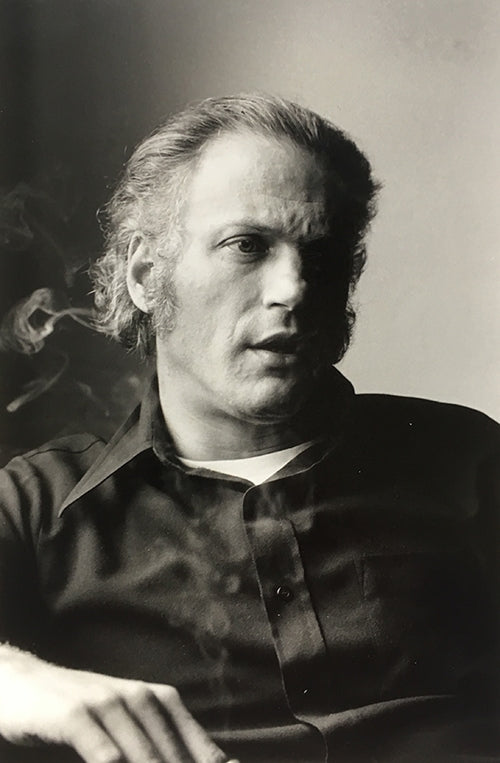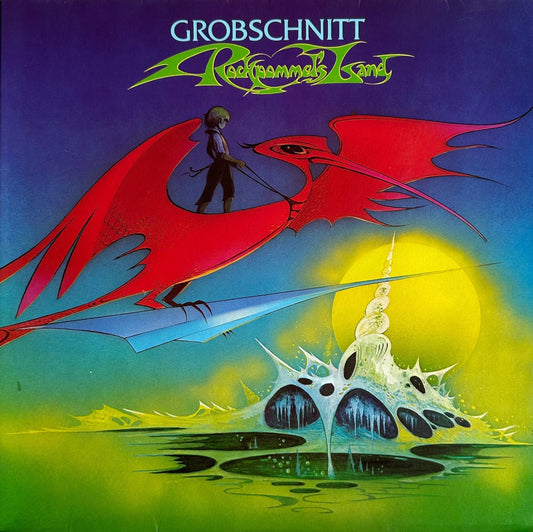 Family photo; Caroline, Abby, Richey, John, and Lou Wasserman, 1949.
Family photo; Caroline, Abby, Richey, John, and Lou Wasserman, 1949.John Wasserman was born in northern California in 1938. His father, Louis, was a scholar of Jewish ancestry who became a professor at San Francisco State (College). His mother, Caroline, was a Methodist from Minnesota, a pianist, schoolteacher, and puppeteer. He grew up in Mill Valley, which was, at the time, a very small town in Marin County (north of San Francisco). He had two younger siblings, his sister, Abby, and his brother, Richey. Health issues impacted the two boys – John with asthma, and Richey with polio (from which he recovered).
John’s asthma would preclude his joining the Navy, much to his disappointment.
 John at his typewriter in the Chronicle newsroom, 1966. Photo by Bill Young.
John at his typewriter in the Chronicle newsroom, 1966. Photo by Bill Young.
In his teenage years, John’s pursuits included poker, bridge, drinking, and bowling. He did not finish college, holding numerous unrelated jobs all the while aspiring to be a newspaperman. He practically begged the Chronicle for a chance at employment, offering to sweep the floor if need be. When an assistant entertainment critic’s position became available, he auditioned by writing a movie review. One of the editors who rated the submissions said that John’s review “was the only one that didn’t bore me.” John ultimately took the mantle of Pop Music Critic following the departure of Ralph J. Gleason, one of the founders of Rolling Stone magazine. It took some years before John’s writing would blossom fully into the humorous, somewhat snarky, and outrageous style for which he would become known (and make his mark). Abby feels his best writing occurred from 1970 until his untimely death in 1979. John wrote a very irreverent five-part series on “How to Be a Critic,” which included gems like: "Arrogance – How to Learn It" "Leaving the Theater Backwards (So As To Appear To Be Walking In)" "Sarcasm, Vilification, Sexual Innuendoes and Other Basic Techniques" In a column that was ostensibly about turning 40, John opened with: “It is Sunday morning, August 13, 1938. In faraway San Rafael, at little Cottage Hospital, a babe is born. His parents beam down at the little nipper.
‘We will call him John,’ they say proudly, ‘in honor of the toilet.’” John also enjoyed a close, but contentious, friendship with promoter Bill Graham. They played ping-pong together and, being frustrated musicians, occasionally sat in with bands – John playing congas and Bill playing the cowbell. When they fought, there was much screaming and slamming of phones at the Chronicle offices.

I remember reading John’s review (which I still have) of a 1972 Winterland concert that I had attended. His headline was “A Shattering Experience.” The opening act was The Blues Project, followed by John McLaughlin’s Mahavishnu Orchestra (on their first tour). The headliner was Emerson, Lake & Palmer, who were, at the time, my favorite band. They had a hard time following McLaughlin’s outfit. Wasserman described the Mahavishnu Orchestra’s music as “a seething maelstrom of high-tension jazz-rock that makes Blood, Sweat & Tears or Chicago seem about as revolutionary as the Firehouse Five Plus Two.” (He was referring to a Dixieland jazz band from the 1950s and early 1960s that featured members of the Disney animation department!) When he got around to ELP, he called Keith Emerson “the piano and phallus master of the group.” That last descriptor alluded to an electronic instrument that looked to me like a two-by-four with a metal strip that produced oscillating tones through the sliding of fingers along its length. Emerson held it jutting from his crotch as he played, hence the phallic reference. As I wrote in Part One, John could make you laugh even while he was writing uncomplimentary things about your favorite artists (Rod Stewart fans, see below). Here’s another one of my favorite columns of his (I still have the original newspaper clipping on this one, too), a review of a concert by Rod Stewart at the Cow Palace.
How Soon They Disremember December 21, 1977
By golly, to think I had almost forgotten. Thank you, Rod Stewart, for making it happen for me again.
I speak, of course, of that unique event of contemporary American culture – the superstar rock and roll show.
Sometimes, the memories fade. You go to your Close Encounters of the Third Kind, all bundled up in a warm theater, or your Oscar Peterson solo program at the Great American Music Hall, and you forget the raw…how to describe it?...the raw uncooked quality that only superstar rock and roll, executed before 14,000 howling fanatics in an enormous hall, can produce.
Rod Stewart, one of the major stars of pop music, sold out the Cow Palace Monday night and again last night – his first appearances here in some two years.
I was there Monday. And they came flooding back, those misty sensations, in a torrent of rushing currents, a rippling tidal wave of déjà vu, a tsunami of nostalgia, brooking no rivulets of streaming fluoridation.
You forget what rock and roll can be.
You forget that heady aroma of a hundred gallons of cheap red wine, spilled on the pavement, rushing up to embrace you like an old friend as you kick your way through a ton of trash and broken glass left in the parking lot by the swine who happily milled there only hours before.
You forget those fabulous frisks at the outer door, those friendly hands of “special” cops who go through your belongings and pat you down like a very special criminal.
You forget the electricity of those first steps into the lobby, and the comatose faces milling about, so stoned they can’t focus their eyes.
You forget the assault of sound that greets you as you enter the main room, so loud that conversation is shouted or not at all, so distorted that the term “music” is rendered euphemism.
You forget the challenge of picking your way to your seat through bodies slumped on the floor, trying ever so hard not to step on anyone, trying ever so hard not to slip in the rain puddles of soda pop spilled everywhere.
You forget that you don’t have a seat, for this is “festival seating,” which means that all the hassle involved with knowing where you’ll be located is obviated.
You forget how the fireworks go flying through the audience, landing in a crowd of people who have nowhere to go, and maybe, if you’re lucky, seeing some woman’s hair set afire. What a flash.
You forget how truly bad the music is under these circumstances, how unintelligible the lyrics, how drearily sung by truly ordinary talent.
You forget the ritualized, stylized, synthetic spontaneity of the performances, artifice as energy, rehearsed intensity of leaps and bounds so tired and flabby that the entire show has a double chin.
You forget the patter, and the proper answers to questions like: “Hey, are you grooving?”
You forget the skill and timing with which Rod Stewart shakes his red satin-clad buns, or drops his red, gauzy blouse off one shoulder.
You forget how often he does it.
You forget the shrieks and howls that each pathetic spasm engenders.
You forget the songs, and their titles.
You forget the genuine contentment that accompanies the realization that, after 40 minutes, you have seen all there is, if anything.
You forget the inner peace that consumes you as you put on your jacket, fold your notebook, cap your pen and head for the exit.
You forget the skill required to avoid coming in contact with anyone as you leave, and the deep satisfaction which comes from knowing that, once again, you have avoided contracting a communicable disease.
You forget the freshness of the air as you step outside, walk briskly past the Daly City paddy wagon and climb into your car for the intoxicating escape back to civilization.
You forget, if possible, that it ever happened.
 Praise, Vilification, and Sexual Innuendo, book cover.
Praise, Vilification, and Sexual Innuendo, book cover.If these articles have piqued your interest in reading more of John Wasserman’s writing, used copies of Abby’s out-of-print book are still being offered for sale on Amazon.
All photos and excerpts reprinted by kind permission of Abby Wasserman. Header image photo by Sydney Goldstein.



